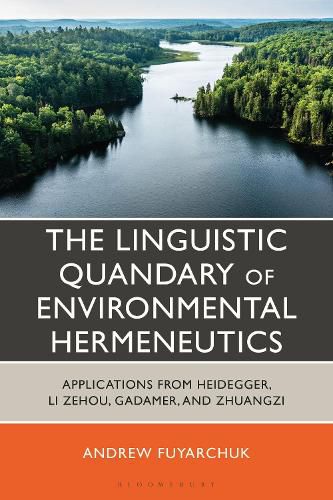Readings Newsletter
Become a Readings Member to make your shopping experience even easier.
Sign in or sign up for free!
You’re not far away from qualifying for FREE standard shipping within Australia
You’ve qualified for FREE standard shipping within Australia
The cart is loading…






Within the context of the Age of the Anthropocene, this book outlines the existential preconditions for understanding the language of nature.
Andrew Fuyarchuk uses environmental hermeneutics as an example of a social conundrum, which is traced to the barriers created by Heidegger to understand animals-in-their environment. In response to these barriers, the author draws on the anthropological ontology of Li Zehou and Daoist philosophy. In contrast to the tradition of metaphysics that overshadows Heidegger, these philosophies think about humans and nature within a "one-world view" and thereby provide the conceptual resources to redefine what it means to be a human being from the domain of "being-in-nature." This entails a transformation in the meaning of existence that the author develops in terms of three Gadamerian dispositional preconditions for a hermeneutics of nature: empathetic bodily affinity, receptivity to ambient environments, and imitation as a way of knowing.
$9.00 standard shipping within Australia
FREE standard shipping within Australia for orders over $100.00
Express & International shipping calculated at checkout
Stock availability can be subject to change without notice. We recommend calling the shop or contacting our online team to check availability of low stock items. Please see our Shopping Online page for more details.
Within the context of the Age of the Anthropocene, this book outlines the existential preconditions for understanding the language of nature.
Andrew Fuyarchuk uses environmental hermeneutics as an example of a social conundrum, which is traced to the barriers created by Heidegger to understand animals-in-their environment. In response to these barriers, the author draws on the anthropological ontology of Li Zehou and Daoist philosophy. In contrast to the tradition of metaphysics that overshadows Heidegger, these philosophies think about humans and nature within a "one-world view" and thereby provide the conceptual resources to redefine what it means to be a human being from the domain of "being-in-nature." This entails a transformation in the meaning of existence that the author develops in terms of three Gadamerian dispositional preconditions for a hermeneutics of nature: empathetic bodily affinity, receptivity to ambient environments, and imitation as a way of knowing.